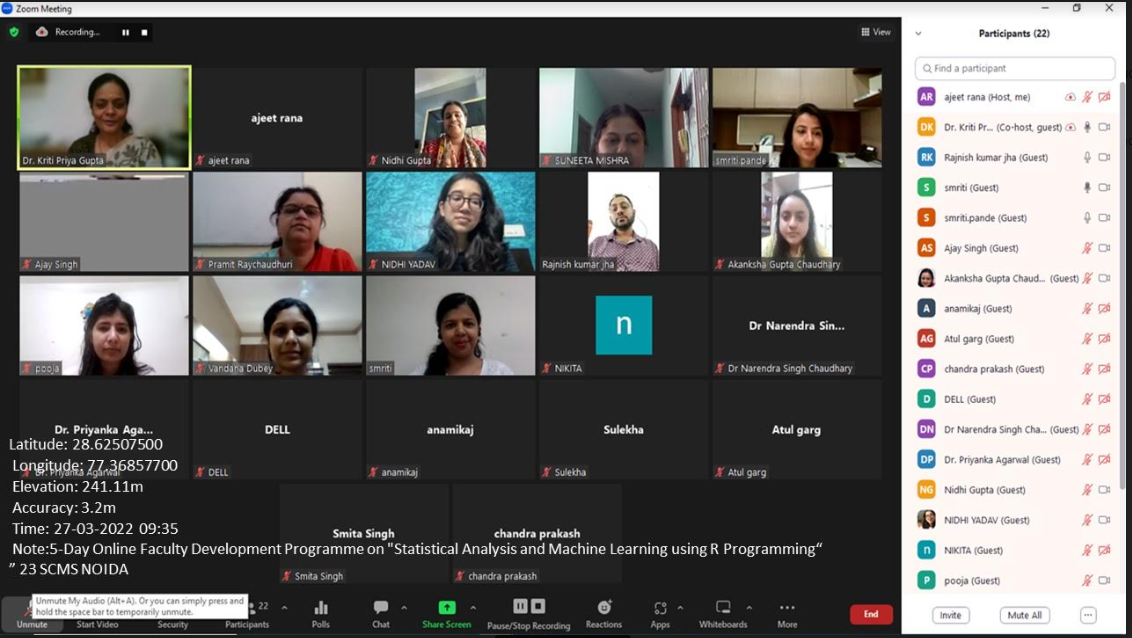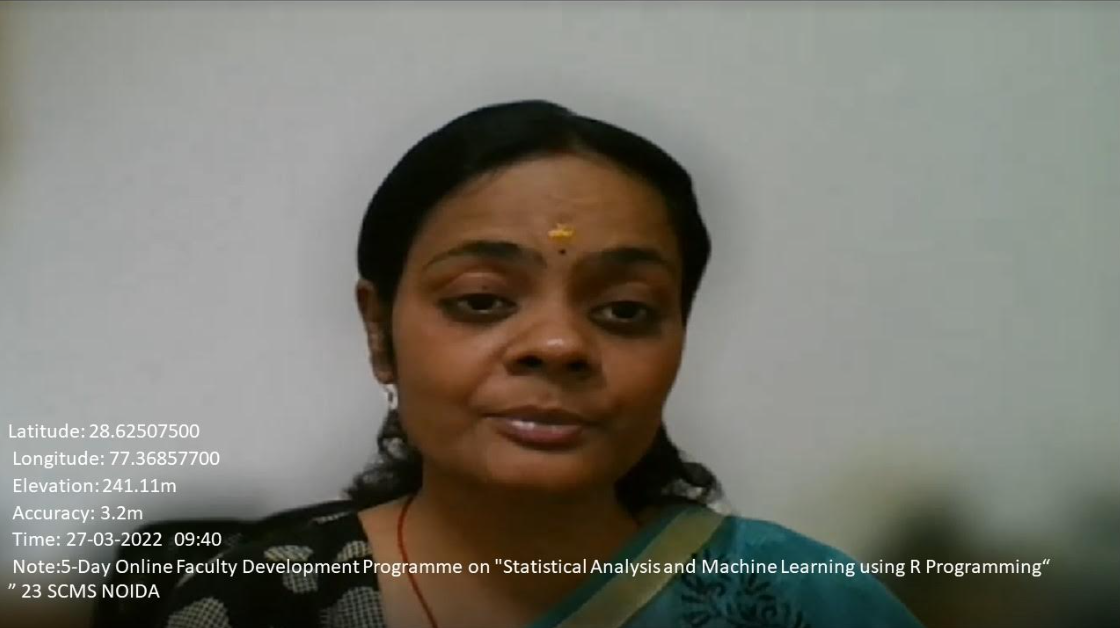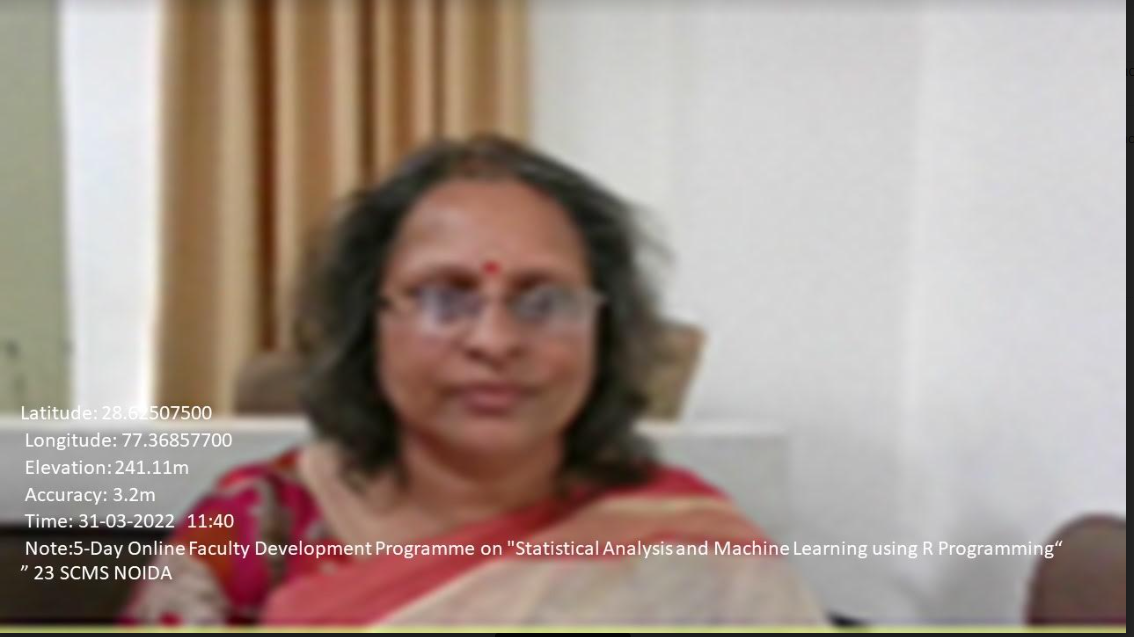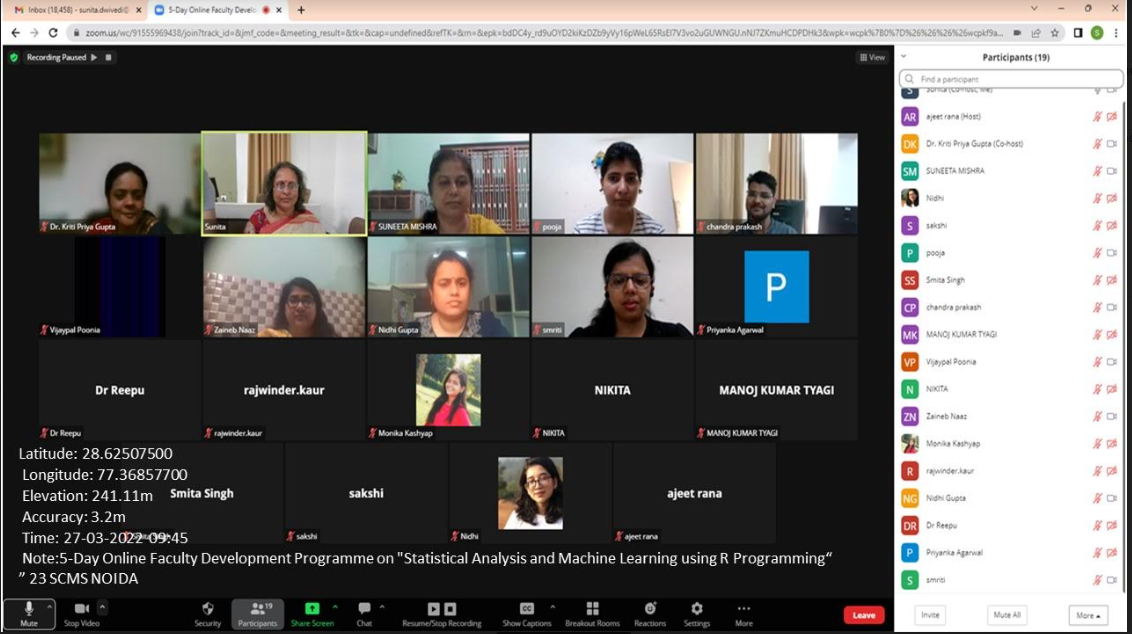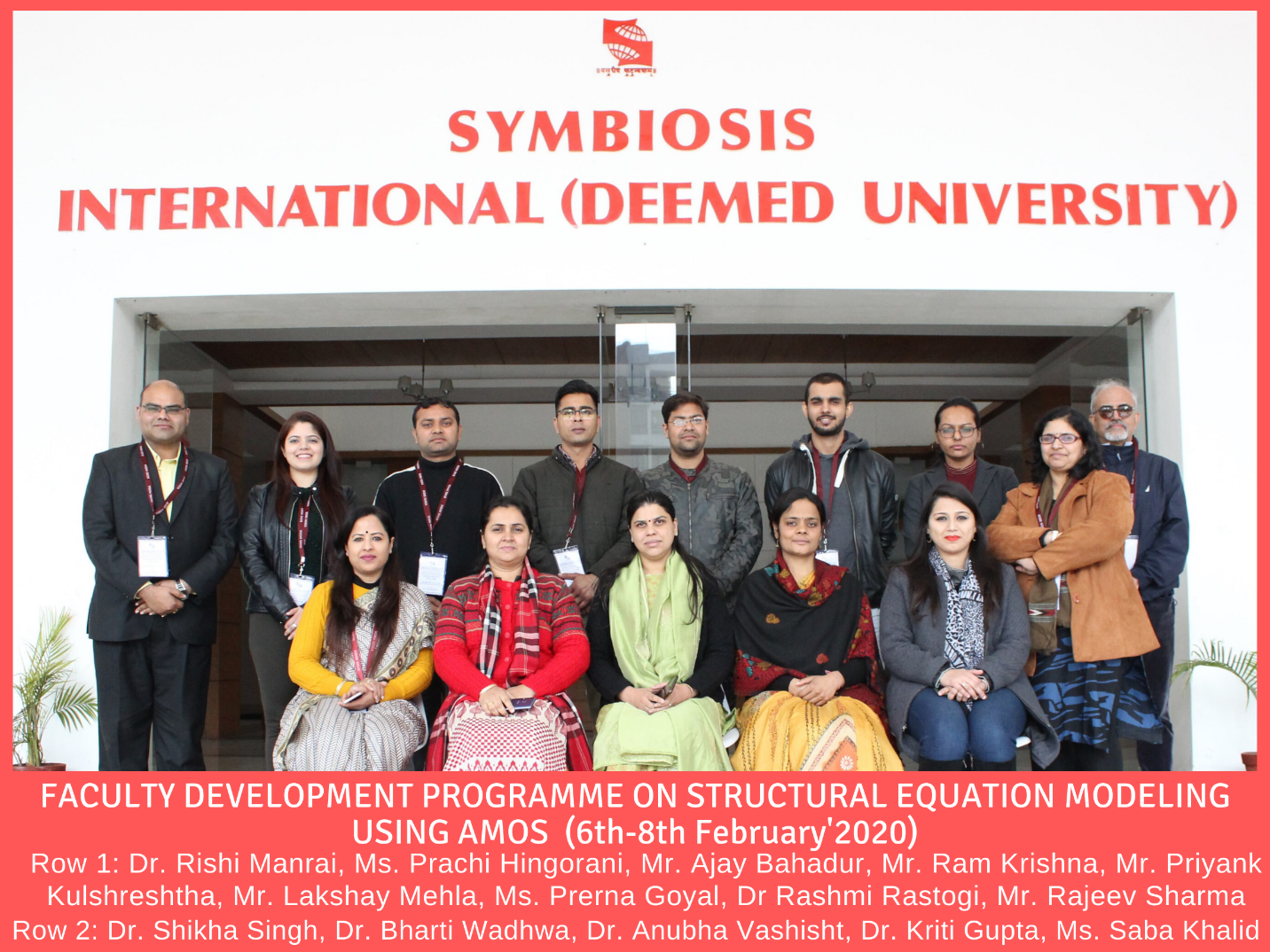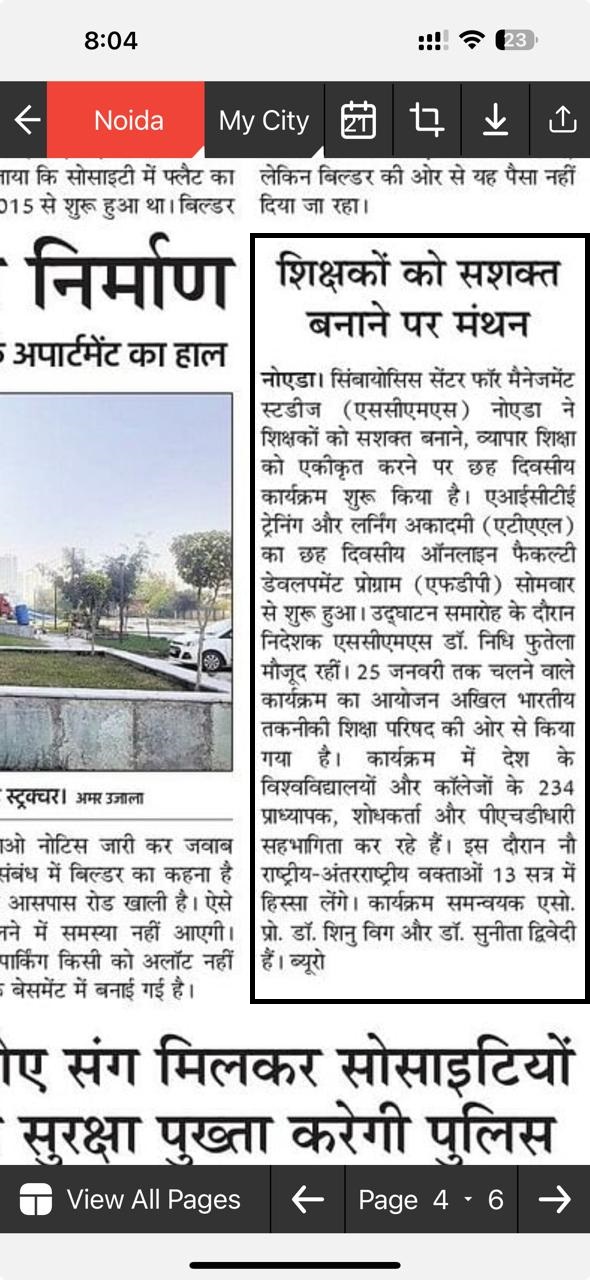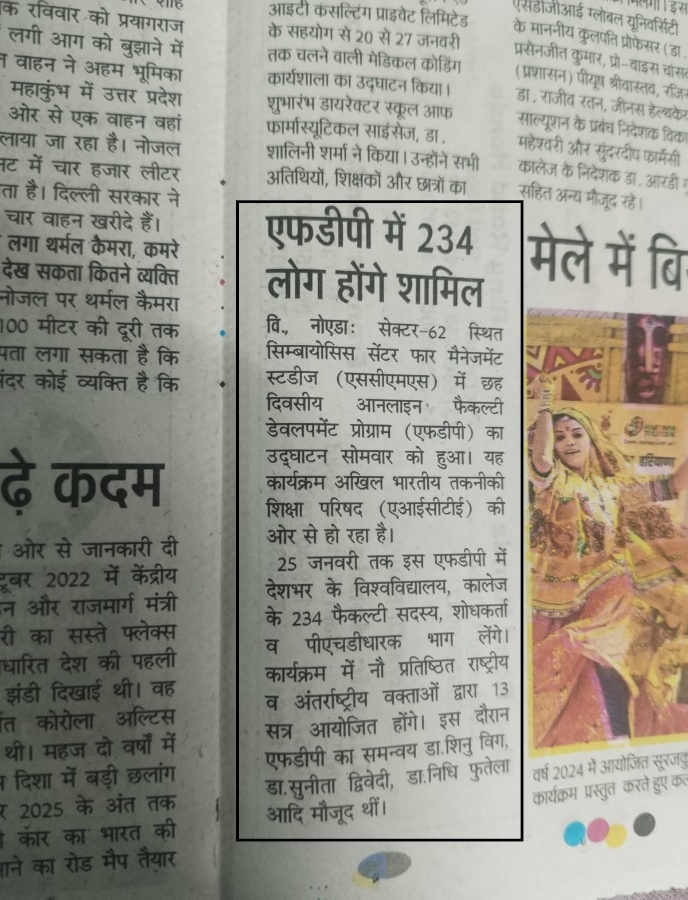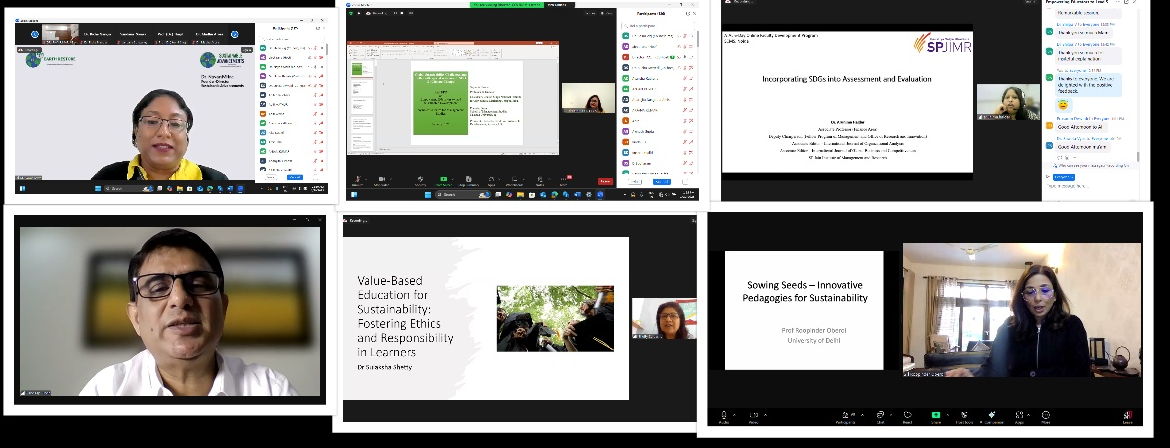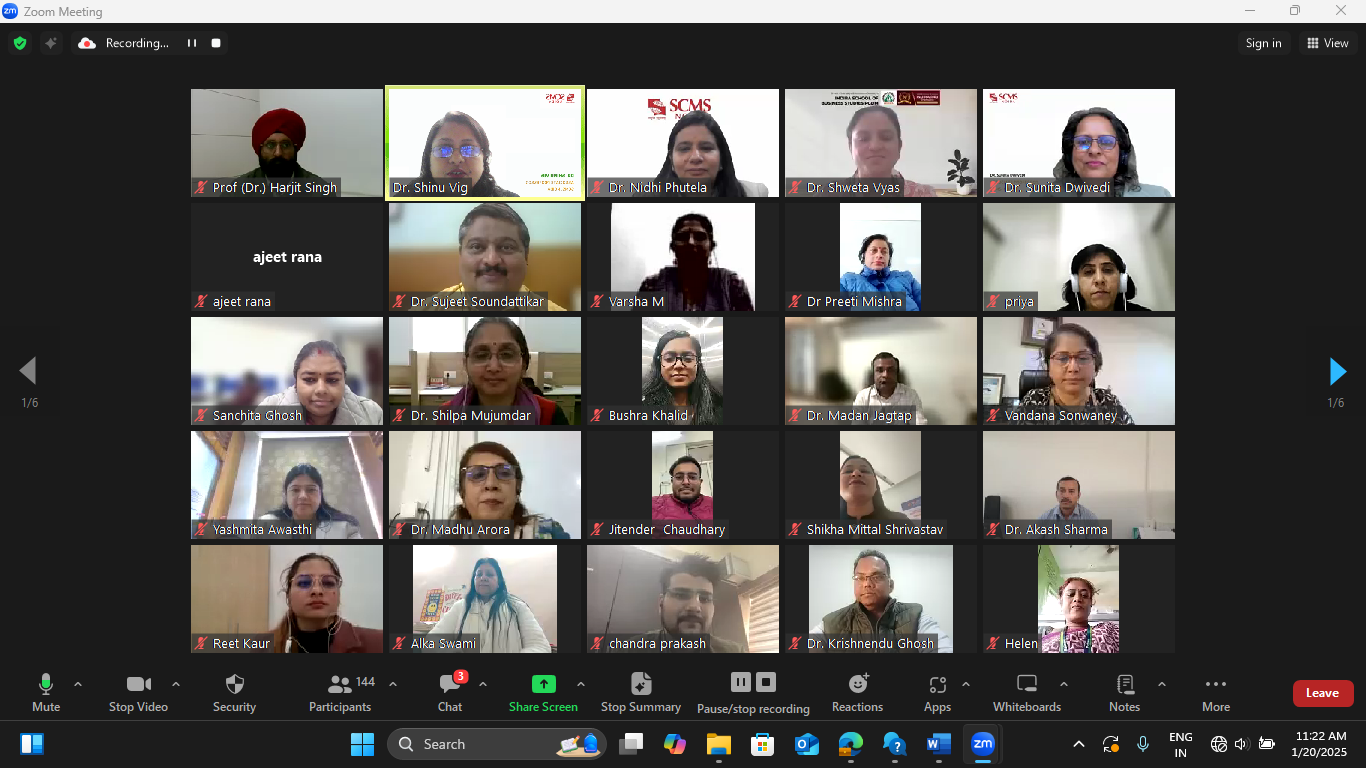5-Day online Faculty Development Programme on “Statistical analysis and Machine
Learning using R Proramming”
A 5-Day online Faculty
Development Programme (FDP) on “Statistical analysis and Machine Learning using
R Proramming” was organized by the Quality Improvement cell (QIC) and Institute
Research Committee (IRC) during 27-31 March 2023. The FDP received an
overwhelming response with 34 participants from various Universities and
Institutes such as BITS-Pilani, Gautam Buddha University, Aligarh Muslim
University, Jaypee Institute of Information technology, Sharda University,
NMIMS-Mumbai, Ramaiah University of Applied Sciences, Sikkim Manipal Institute
of Technology and so on.
This FDP was intended to
provide hands-on training in applying various statistical and machine learning
techniques using R programming. A total of 10 teaching sessions were
conducted during the FDP via ZOOM platform, out of which Sessions 1-9 were
conducted by Dr. Kriti Priya Gupta, Professor - SCMS NOIDA and Session 10 was
conducted by Dr. Sunita Dwivedi, Associate Professor - SCMS NOIDA. Each day of
the FDP had 2 teaching sessions and 1 practice session wherein
participants were given hands-on practice exercises.
Day 1 stated with
Session 1 wherein the participants were introduced to the interface of R and the
differences between R and R Studio. They were also introduced to the basic data
types that are used in R. In Session 2, the concept of objects in R was
discussed and the participants learnt how to create and manipulate various R
objects.
Sessions 3 and 4 were
conducted on Day 2, that focussed on performing descriptive statistical analysis
using R programming. The participants learnt how to create frequency
distributions and charts in R studio. They also learnt to import datasets in R
Studio and to calculate statistical measures and perform normality testing and
reliability testing on the imported data.
During the Session 5 on
Day 3, the participants learnt to conduct various statistical tests (such as
t-tests, ANOVA, correlation and chi-square test) in R Studio. Session 6 focussed
on performing linear regression analysis using continuous as well as categorical
independent variable.
Day 4 focussed on
supervised machine learning techniques. During the Session 7, the participants
learnt about regression-based techniques and in Session 8, they learnt about
classification-based techniques such as Logistic Regression, Naïve Bayes
algorithm and Decision trees. They also learnt about the “caret’ package in R
that is used for implementing machine learning techniques.
On Day 5, Session 9
focussed on unsupervised machine learning techniques wherein participants learnt
perform Principal Component Analysis and k-means Clustering using R. Session 10
focussed on performing Social Network Analysis (SNA) using R programming. The
participants learnt the theoretical concepts of SNA as well as the
implementation of SNA in R Studio.
During the FDP, the
participants were involved in a continuous learning process through hands-on
examples and practice exercises. The FDP received very good feedback from the
participants. All the participants had a great learning experience during the
FDP.
FDP on “Structural Equation Modeling using AMOS”
A Faculty Development
Programme (FDP) on “Structural Equation Modeling using AMOS” was organized by
the Institute Research Committee (IRC) during 6-8 February 2020. This FDP was
designed to provide hands-on training to develop and test models using
Structural Equation Modeling (SEM) with AMOS software.
Dr. Kriti Priya Gupta,
Professor - SCMS NOIDA was the resource person for the FDP.
During the programme,
the participants learnt about the following topics:
- Concept of measurement, Defining a construct, Types of constructs, Reflective
and Formative Scales
- Introduction to SEM, Path Analysis in SEM
- Differentiation between Exploratory Factor Analysis (EFA) and Confirmatory
Factor Analysis (CFA)
- Model Assessment, Model fit indices, Reliability and Validity measures
- First-order CFA, Second-order CFA
- Higher order effects: Moderation analysis using multi-group analysis, and
Mediation analysis using bootstrapping technique
The FDP received good
feedback from the participants.
Empowering Educators to Lead Sustainable Development: Integrating SDGs into Business Education
FDP Thrust Area: Sustainable Development Goals
Date: 20th January 2025 to 25th January 2025
Program Overview
Symbiosis Centre for Management Studies (SCMS), Noida, (a constituent of Symbiosis International Deemed University, Pune), successfully conducted the ATAL 6-Day Online Faculty Development Program (FDP) on "Empowering Educators to Lead Sustainable Development: Integrating SDGs into Business Education". This prestigious program, sponsored by the All India Council for Technical Education (AICTE), underscores Symbiosis International University’s and SCMS Noida’s commitment to fostering sustainability-focused academic leadership. The FDP, spanning from January 20 to January 25, 2025, brought together 235 faculty members, researchers, and Ph.D. scholars from universities and colleges across India. Over the course of six days, this FDP featured 13 sessions led by 8 eminent national and international speakers from academia and industry. The program witnessed active participation from all the participants fostering an engaging learning experience focused on sustainability and business education.
Objectives of the FDP
- To enhance educators' understanding of the Sustainable Development Goals (SDGs) and their relevance in business education.
- To explore innovative pedagogies and curriculum design strategies that integrate sustainability.
- To provide a platform for networking and collaboration among faculty members across institutions.
- To promote interdisciplinary approaches for teaching sustainability in higher education.
Alignment with Sustainable Development Goals (SDGs)
This FDP directly aligned with the following SDGs:
- SDG 4: Quality Education – Focused on empowering educators to integrate SDGs into their teaching and curriculum development.
- SDG 8: Decent Work and Economic Growth – Indirectly contributed to preparing future-ready professionals equipped with sustainability knowledge.
Day-wise Program
Day 1
The first session titled "Understanding the SDGs" was conducted by Dr. Nayan Mitra, Founder of Sustainable Advancements (OPC) Private Limited and National President of the Women’s Indian Chamber of Commerce and Industry (WICCI) Sustainable Businesses Council; G-100 for Circular Economy. Dr. Mitra explained the history, evolution and the need for SDGs.
The second session titled "Deep Dive into SDGs" was led by Dr. Sapna Narula, Director of the CCS National Institute of Agricultural Marketing (NIAM). Dr. Narula has been the founder Dean of School of Management studies at Nalanda University. She explained the various SDGs with a special emphasis on climate change.
Day 2
The first session, titled "SDGs in Education/Sustainable Higher Education – Focus on the Holistic Development of Students," was delivered by Dr. Roopinder Oberoi, Fellow at the Institute of Eminence, Delhi School of Public Policy and Governance (DSPPG), and Professor at the Department of Political Science, KMC, University of Delhi. Dr. Oberoi emphasized the importance of raising student awareness about sustainability concepts and nurturing their holistic development through sustainable higher education practices.
The second session, titled "Integrating Sustainability in Curriculum and Campus Practices" led by Prof. (Dr.) Alok Pandey, Professor and Vice Dean at the Jindal School of Banking & Finance, O.P. Jindal Global University (JGU), explored diversity, resilience, and well-being through the lens of sustainability. Dr. Pandey highlighted how these concepts are deeply interconnected and encouraged participants to integrate them into various disciplines, viewing sustainability not as an isolated idea but as a guiding framework for systemic change.
Day 3
The first session, "Collaborative Research and Teaching Opportunities," was delivered by Dr. Arunima Haldar, Associate Professor at SP Jain Institute of Management & Research, India. She highlighted avenues for educators and researchers to collaborate across disciplines, driving impactful and sustainability-focused research and teaching practices.
The second session, led by Dr. Nayan Mitra, founder of Sustainable Advancements (OPC) Private Limited, delved into the Stakeholder Theory and the Concept of Shared Value. She explained how businesses and educators can align with stakeholders to create shared value while addressing sustainable development goals, ensuring a positive impact on society and the environment.
Day 4
First session on the topic: "Values-Based Education for Sustainability: Fostering Ethics and Responsibility in Learners" was conducted by Dr. Sulaksha Shetty, CHRO at SB-Constantia, Mumbai. Dr. Shetty emphasized the importance of nurturing ethics and responsibility in students through values-based education, encouraging participants to cultivate a mindset of integrity and sustainability among learners.
Second session on "Incorporating SDGs into Assessment and Evaluation" was led by Dr. Arunima Haldar, Associate Professor at SPJIMR, Mumbai. Dr. Haldar shared innovative strategies to align assessments with Sustainable Development Goals (SDGs), showcasing how educators can evaluate students' progress while promoting a sustainability-oriented perspective.
Day 5
First Session on "Collaborative Networks for SDG Impact" was conducted by Mrs. Richa Mohan – Founder, Empowering Minds. This session explored the role of collaborative networks in driving Sustainable Development Goals (SDGs), emphasizing partnerships across sectors to create meaningful impact and highlighted stakeholder engagement, policy advocacy, and grassroots impact.
The second session was conducted by Dr. Sapna Narula – Director, National Institute of Agricultural Marketing on the topic "SDGs and Case-Based Learning." Dr. Narula demonstrated how real-world case studies can be leveraged for education, decision-making, and sustainable business practices.
Day 6
First session was conducted by Dr. Shinu Vig on the topic "SDGs and Entrepreneurship." Dr. Vig discussed the concepts of sustainable entrepreneurship, social entrepreneurship, and eco-preneurship. Participants were engaged through the real case studies aligning entrepreneurship with SDGs.
Second session on "Innovations and Solutions for the Future" was conducted by Mr. Sandeep Singh, Founder & Director, The Farm Trade, Malaysia. Mr. Singh inspired participants by sharing practical insights on leveraging innovation to address sustainability challenges. His expertise in revolutionizing agricultural trade through cutting-edge practices provided actionable ideas for future-ready solutions.
Third session on "SDGs and Innovative Pedagogies" was taken by Dr. Roopinder Oberoi, Professor, Delhi University. Dr. Oberoi emphasized the importance of integrating SDGs into academic frameworks using creative teaching methods such as experiential learning. Her session highlighted how educators can inspire students to adopt a sustainability mindset.
Inaugural Session
The inaugural session of the ATAL Faculty Development Program (FDP) on "Empowering Educators to Lead Sustainable Development: Integrating SDGs into Business Education" received significant media coverage. Some press clippings from Dainik Jagran and Amar Ujala newspapers (Dated 21st January 2025) are appended below:
The FDP successfully provided participants with a comprehensive understanding of the Sustainable Development Goals and their application in business education. The program encouraged interdisciplinary collaboration, innovative teaching methodologies, and the integration of sustainability into curriculum design.
Organized by
Symbiosis Centre for Management Studies-Noida
A Constituent of Symbiosis International (Deemed) University, Pune, India
Sponsored by
AICTE Training and Learning (ATAL) Academy
FDP Coordinator:
Dr. Shinu Vig, Associate Professor, Symbiosis Centre for Management Studies-NOIDA
FDP Co-coordinator:
Dr. Sunita Dwivedi, Associate Professor, Symbiosis Centre for Management Studies-NOIDA


